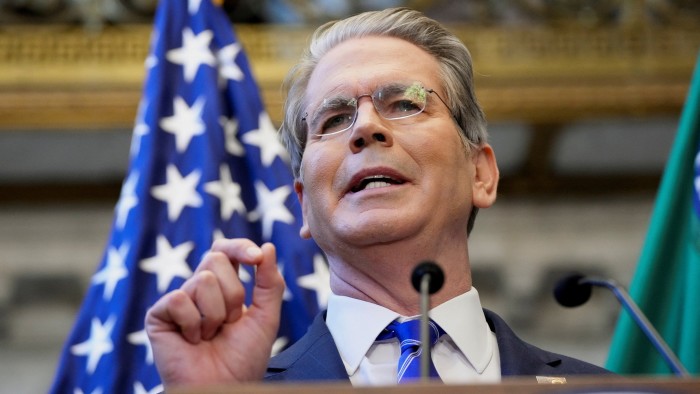This article is an on-site version of our FirstFT newsletter. Subscribers can sign up to our Asia, Europe/Africa or Americas edition to get the newsletter delivered every weekday morning. Explore all of our newsletters here
Good morning and welcome back to FirstFT Asia. In today’s newsletter:
-
US warns of ‘decoupling’ from China
-
India’s Diwali tax cuts
-
A deep dive on First Brands’ secretive founder
-
How weight-loss drugs killed the business lunch
We start with the latest on the US-China trade dispute, as Treasury secretary Scott Bessent warned Beijing that its new sweeping export controls on rare earths and critical minerals would force the world to decouple from China.
‘Signs of decoupling’: Bessent delivered the warning at a news conference yesterday, where he spoke alongside US trade representative Jamieson Greer. “If China wants to be an unreliable partner to the world, then the world will have to decouple,” Bessent said. “The world does not want to decouple. We want to de-risk. But signals like this are signs of decoupling, which we don’t believe China wants.”
Why it matters: Beijing last week unveiled the policy for rare earths and critical minerals that will require non-Chinese companies exporting products containing even small amounts of the minerals to obtain a government licence. The move — which could have a big impact on global supply chains given China’s dominance in the rare earths industry — prompted President Donald Trump to threaten an additional 100 per cent tariff on imports from China by November 1.
Bessent and Greer also criticised Li Chenggang, the top negotiator on the Chinese trade team who they said made an uninvited visit to Washington in August, where he was “very disrespectful”. Read the full story.
Here’s what else we’re keeping tabs on today:
-
Economic data: Australia reports September employment figures
-
Chinese diplomacy: The Swedish and Canadian foreign ministers visit Beijing.
-
Earnings: Infosys and Taiwan Semiconductor Manufacturing Company report results.
Five more top stories
1. Chinese fast-fashion retailer Urban Revivo has stepped up ambitious plans to challenge the likes of Zara and H&M by expanding in London in a revived push into international markets. The retailer is part of a wave of companies pushing to expand overseas as China’s hyper-competitive markets mature and its economic growth slows.
-
Persistent deflation: China’s economy remained mired in deflation last month, official data showed.
-
Luxury sector rally: LVMH shares surged 13 per cent yesterday after the luxury group reported a return to growth in the third quarter, including a 7 per cent sales increase in mainland China.
2. Top US financiers have warned of an erosion in lending standards after credit markets were shaken by the collapse of First Brands Group and Tricolor Holdings. “In some of these more levered credits, there’s been a willingness to cut corners,” Marc Rowan, chief executive of Apollo Global Management, told the FT Private Capital Summit in London.
3. Sir Keir Starmer has said he will publish key witness statements in the failed prosecution of two British men accused of spying for China. The UK prime minister made the pledge as he dismissed what he called “baseless accusations” that his government had undermined the case to avoid tensions with Beijing. Read more about the controversy.
4. An anonymous victim of Jeffrey Epstein filed lawsuits against Bank of America and BNY over their ties to the late sex offender, in the latest class-action complaints against the financier’s banks. The complaint accused BofA of “participating in and financially benefiting” from Epstein’s sex-trafficking operation. Here are more details.
5. Syrian President Ahmed al-Sharaa met Vladimir Putin for the first time yesterday, signalling a possible rapprochement after Sharaa’s rebel forces toppled Putin’s longtime ally Bashar al-Assad last year. Sharaa promised to ‘‘reset’’ relations with Russia at talks in the Kremlin, while Putin alluded to Russia’s eagerness for a new start.
News in-depth
Indian shoppers have long been lured by discounts during colourful celebrations in the run-up to the annual Diwali festival. But this year’s festivities have been turbocharged by tax cuts — dubbed the “GST Savings Festival” — in hopes of boosting consumer sentiment in the world’s most populous country. Indian companies are hoping Prime Minister Narendra Modi’s “Diwali gift” can counterbalance the drag from global trade tensions.
We’re also reading . . .
-
First Brands collapse: Founder Patrick James’ borrowing binge is a reflection of the nearly $2tn private credit industry and the broader risks created by its rise.
-
The death of the business lunch: Weight-loss jabs such as Ozempic and Mounjaro are leading executives to order smaller portions and creating a headache for restaurateurs.
-
Israel-Hamas war: Israeli prisons have become an unwitting training ground for the next generation of Palestinian leadership.
Chart of the day
Morgan Stanley overtook arch-rival Goldman Sachs in equities trading in the third quarter for the first time since 2022, helping the investment bank’s profits jump by almost half.

Take a break from the news . . .
This year has seen a glut of action-adventure video games set in feudal Japan. What’s the appeal? Tom Faber explores the interest in games such as the new Ghost of Yōtei.

Source link









